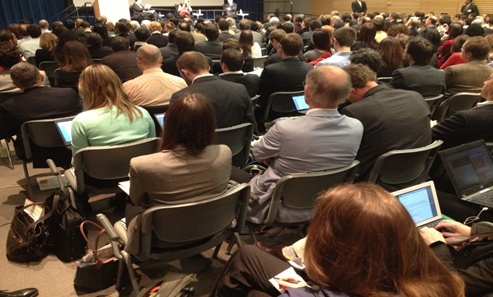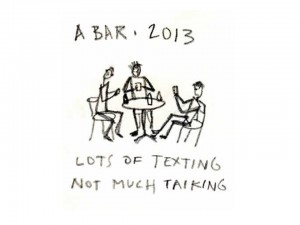By Jonas Hagen (with input from Carlos Pardo), also appearing in http://slowcity.tumblr.com/
OK, this is a big topic, sure. Let me share a tale with you. I went on a trip recently from the United States of A to a cold Northern European country with fellow university students and I forgot the power cord for my computer at home. I tried in vain to buy a replacement and resigned myself to spending nine laptop-less days. This trip was full of lectures and I always sat at the back of room, so I got to see what the non-forgetful people were doing on their tablets, laptops, smartphones, etc.
The completely unscientific results of my survey of the activities carried out on the devices:
– 75 % visiting a popular social networking website
– 20 % playing videogames
– 3 % online shopping
– 2 % doing other work (not at all related to the lecture)
So what has technology, or more specifically, what have small, portable, always connected to the world-wide-web computers, done to the classroom learning experience? One answer: we’re not present anymore. Our minds are constantly in different places, rarely concentrating on what’s going on where our bodies are. For those of us that were already prone to daydreaming (I include myself here), we’re even less present.
A maverick mayor of a major city is making a speech – a perfect time to catch up on emails.
Photo: Dr. Enrique Jacoby
When I go to bars these days I often see a few people sitting at the same table, each staring at a smartphone, no one talking to their neighbor.
A few weeks ago I went into the men`s lavatory and (excuse the graphic imagery) saw a gentleman relieving himself and sending a text message at the same time. A few days ago, at another location, I saw another gentleman doing the same thing. I made a comment and he said, “well these days you use the five minutes of bathroom time to send texts and emails.” It seems like the “peext,” o or “pee-mail” has become a part of life.
 OK, some people have had telephones in their bathrooms for decades, and I am not suggesting we prohibit these practices or go back to a pre-smartphone world. But I do think it’s worthwhile to reflect on the costs of these technologies as well as the benefits. That way we can make better informed decisions about when to use them, and when not to, instead of having the simply take over our lives.
OK, some people have had telephones in their bathrooms for decades, and I am not suggesting we prohibit these practices or go back to a pre-smartphone world. But I do think it’s worthwhile to reflect on the costs of these technologies as well as the benefits. That way we can make better informed decisions about when to use them, and when not to, instead of having the simply take over our lives.
Another anecdote: I recently went to court to see an important case involving a nuclear reactor that a state wants closed to protect its people from death and disaster and a corporation wants open so it can make tons of money. No cellphones allowed in court; everyone checks theirs at the door. Guess what? Everyone pays attention to what is happening. It’s almost a surreal experience.
I once had an smartphone with an internet connection. I am a bit obsessive and checked my email every 2 minutes, and also felt that I should constantly be writing work-related emails. I had no more peace of mind. I now have a simple cellphone. I might get a smartphone for the camera, but don’t want to be constantly connected to email again.
What are the implications of having lots of contact via the web, text, etc, but less contact in the flesh? I suspect that our net (no pun intended) happiness goes down. There is no substitute for being face-to-face with real people. Think of the most meaningful moments in your life. They probably didn’t happen while you were staring at a screen.
Do you ever leave your phone at home and notice that you feel much freer and more present? Maybe in the future we will have bars or other places where no cellphones/smartphones are allowed inside? Maybe teachers will accept that students are doing anything but using computers as learning tools and encourage their students not to bring them to class?
Now I am going to go destroy some looms.









Comentarios recientes